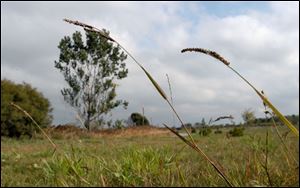
Monroe County: Volunteers asked to help shoreline seeds collection at Sterling
10/6/2004
Grass like this that has gone to seed will be collected by volunteers along beach areas.
MONROE - For three hours this month, the Michigan Department of Natural Resources would like to convince the beachcombers who scour the shores of Sterling State Park to move their efforts a few hundred yards inland.
The DNR is seeking an army of environmental volunteers to harvest native prairie seeds at William C. Sterling State Park and 10 other parks and recreation areas this month. The harvest at Sterling will take place between 10 a.m. and 1 p.m. on Oct. 23.
The seeds collected by volunteers will be used to re-establish and restore tallgrass prairie, lakeplain prairie, oak savanna, and dune ecosystems.
Prairie grass seed from plants such as big bluestem, little bluestem, and indian grass, as well as from a number of wildflowers, will be collected for latter planting by the DNR's Stewardship Program to restore the ecosystems.
The prairie and oak savanna ecosystems, nearly eliminated as southeast Michigan was settled by Europeans in the 18th and 19th centuries, exist today in small remnants, many in Michigan's state parks. Seed collection is a key step in restoring these lost landscapes, but a step that requires many hands, DNR officials said.
"This is an important opportunity to expand and restore these natural ecosystems and preserve them for future generations," said Ray Fahlsing, the DNR's stewardship program manager.
DNR officials are asking volunteers to carry a clean, empty milk jug to collect the seeds, and to wear sturdy hiking shoes and take drinking water and sunscreen. Volunteers under 15 must be accompanied by an adult.
Sterling is along the major flyway for many migratory birds and a great place to see waterfowl, raptors, song birds, and wetland plants. The park is home to the endangered Eastern fox snake and the threatened American lotus.
Just last year, Michigan completed a $12 million renovation of Sterling State Park, Michigan's only state park on Lake Erie. As part of that renovation, the park's former campground was stripped of trees, shrubs, and non-native plants and reseeded with native grasses and vegetation to restore the natural marsh that once was the dominant ecological feature of the area.